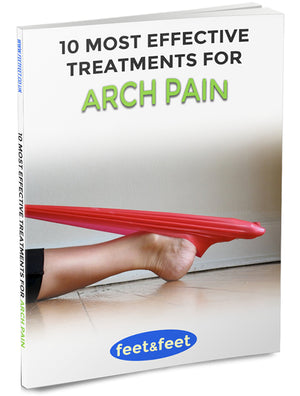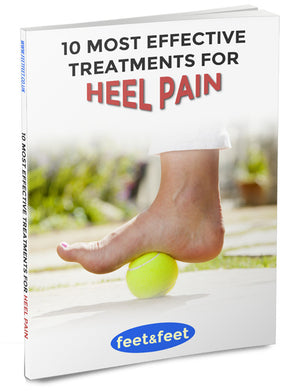The Best Plantar Fasciitis Treatments

When the pain from plantar fasciitis begins to impact your day-to-day life, it’s time to seek treatment. Millions of people in the UK suffer from this common condition that affects the heel and arch of the foot.
In many cases, the pain can be subsided by taking the right steps at the right time (sooner rather than later). Continue reading to discover the best plantar fasciitis treatments that have been proven to work effectively.
Note: If you’re unsure if you have this condition, then you should read about the symptoms of causes of plantar fasciitis first.
What Is Plantar Fasciitis?
Plantar fasciitis is a painful foot condition that affects the sole of the foot, most notably the heel and arch.
It’s caused by damage to the connective tissue network that supports the longitudinal arch of the foot, and this can happen for a number of reasons.
Obesity, a tight Achilles tendon, unsuitable footwear, over exertion and a range of other factors can cause micro tears in the planta fascia, resulting in heel and arch pain in one or both feet.
The pain can often be debilitating, especially after a period of rest or when starting the day, but there is a wide range of treatments for plantar fasciitis that should be explored as soon as possible.
You can read more about the symptoms, causes and risks of plantar fasciitis here.
Wear Supportive Insoles
Most footwear isn’t optimal for plantar fasciitis; unsurprisingly, they’re not designed to relieve that specific condition.
If you find that your work shoes or trainers are uncomfortable or are painful to wear, you should insert a pair of supportive plantar fasciitis insoles that helps to distribute weight evenly throughout the feet.
A well designed pair of plantar fasciitis insoles will help to relieve symptoms in several ways – It will absorb shocks on the heel when you’re active; it’ll stabilise the arch to reduce detrimental movements; and it’ll have the right shape and size to match with the natural contours of the feet.
Use Off-the-Shelf Orthotics
Off-the-shelf orthotics in relation to plantar fasciitis refers to medical devices – such as insoles, heel cups and heel inserts – that can be purchased from online and offline retailers including pharmacies and sports outlets.
Many of the off-the-shelf orthotics suitable for plantar fasciitis consists of products that specifically target the heel of the foot. They are designed to absorb shocks and impact on the heel while increasing comfort.
These types of orthotics are generally compact and easily fit within any type of footwear, making them more suitable for everyday wear and sporting actitivies.
Use Custom Orthotics
Custom orthotics made to treat plantar fasciitis are designed to do the same job as insoles and off-the-shelf orthotics; the main difference is that custom orthotics are moulded to your feet, therefore providing you with a better fit.
As your condition has to be assessed thoroughly and then the orthotic has to be specially made to your requirements, it’s going to be a lot more costly than regular orthotics – often running into the several hundreds.
Yet, there’s still no guarantee of success and in some cases, they’re even less effective than alternative orthotics. It’s a definite must that you go to a reputable custom orthotics professional (e.g. pedorthists and orthotists) to increase the chances of successful treatment.
Wear Supportive Footwear
When poorly fitted footwear causes an imbalance on your feet, this worsens the condition of plantar fasciitis and in some cases, may even be the cause of it.
High heels and shoes with very little support are serious hindrances to the way you walk and the overall health of your feet.
Ideally, supportive footwear will have good arch and heel support, be well-fitted and flexible; these are essential components to prevent or relieve plantar fasciitis.
Perform Low-Impact Exercises
Having plantar fasciitis doesn’t mean that you cannot be active; in fact, it’s highly recommended that you perform low-impact exercises to strengthen your feet and lead you on the road to recovery.
It’s vital that you don’t perform exercises that lead to overexertion or cause too much pressure on the feet. Take a look at our best plantar fasciitis exercises that practically anyone can do.
Use Home Remedies
Taking care of your feet when you’re at home is just as important as looking after them when you’re out and about.
Home remedies for plantar fasciitis such as massaging your feet with essential oils and applying ice packs are simple yet effective treatments that anyone can do.
Lose Weight
If you’re over the weight range that’s considered to be healthy, you would be deemed as being overweight. This means that you’re putting more unnecessary pressure on your feet and as a result, your feet constantly needs to sustain more shocks and impact every time they’re active.
Body Mass Index (BMI) is the measurement that’s used to check if you’re within the healthy weight range (18.5 and 24.9 according to the NHS). You can check your BMI here.
If you’re outside the recommended range determined by your height, weight and gender, then you should lose weight by changing your diet and/or burn off more calories through exercising.
Take Non-steroidal Anti-Inflammatory Drugs (NSAIDs)
Though they cannot prevent plantar fasciitis, non-steroidal anti-inflammatory drugs (NSAIDs) such as Ibuprofen, Naproxen, Diclofenac and high-dosage aspirin, can help to relieve symptoms of the condition such as pain and inflammation.
This type of medicine comes in the form of tablets, capsules, creams and gels, and they’re generally suitable for most people.
However, you need to take precaution if you’re over the age of 65, pregnant, have had allergic reactions to this type of medication, and have breathing problems or any other condition that may be affected by this type of medicine.
Undergo Physical Therapy
If you’re unsure about the best steps you should take to successfully treat and recover from plantar fasciitis, then consider going to a reputable podiatrist or physiotherapist that has experience in different foot conditions.
They will be able to give you a proper diagnosis and give you the right advice specific to the severity of your condition.
They can also recommend and supply orthotics, insoles, night splints and other products that are designed to help relieve heel and arch pain.
Rest Well
Work and busy lifestyles means that people are on their feet for long periods of time everyday, which is even worse if unsupportive footwear is worn. Granted, this is detrimental to the longevity of the feet.
If you’re not allowing your feet to rest for adequate periods of time everyday, then the symptoms of plantar fasciitis will only get worse.
You should sit down for 5-10 minutes if you’re standing for longer than one hour and put your feet up when you’re sitting to alleviate all pressure from the soles of your feet.
Steroid Injections
Steroid injections (also known as corticosteroid injections) are anti-inflammatory medicines that when injected into a joint or muscle, helps to relieve pain, reduce inflammation and stiffness.
Only if you have a more severe case of plantar fasciitis, is this type of treatment suggested by a healthcare professional.
The effect of the medicine can take a few hours to begin working or it can take up to several days, with the effects lasting a few months.
Shock Wave Therapy
The non-surgical procedure known as shock wave therapy (or Extracorporeal Shock Wave Therapy) uses shock waves to induce slight trauma to the tissues of the foot to trigger a healing process.
Though not widely available yet, this type of treatment has been effective for many people who have plantar fasciitis. You can read more about shock wave therapy here.
Consider Plantar Fasciitis Surgery
When all other treatments are deemed to be unsuccessful, the last resort for most people is surgery which is only usually considered if:
- All other non-surgical procedures have failed
- Heel pain relief activities and orthotics do not improve your symptoms
- Your weight is considered to be relatively normal for your height
Surgery for plantar fasciitis is rare and according to the North Bristol NHS Trust, less than 5% of patients require surgery for plantar fasciitis.





Leave a comment